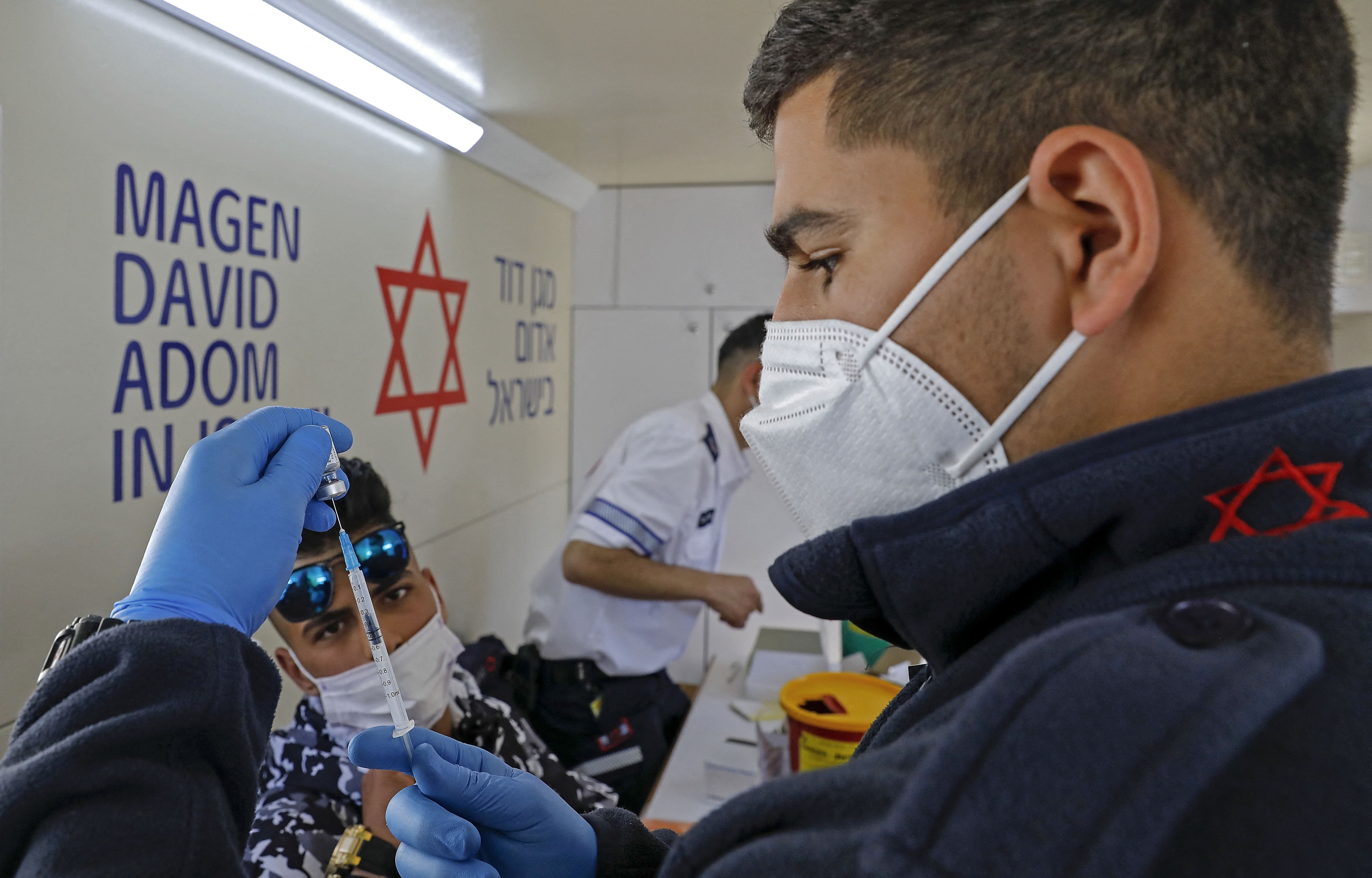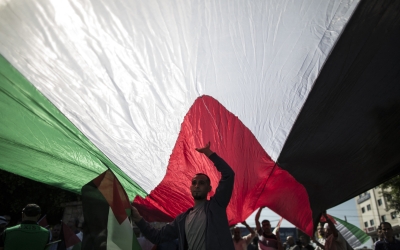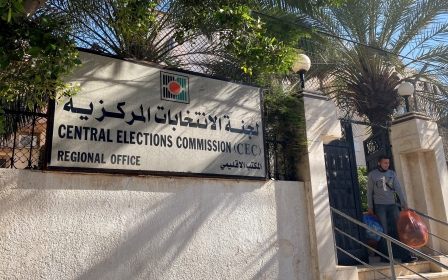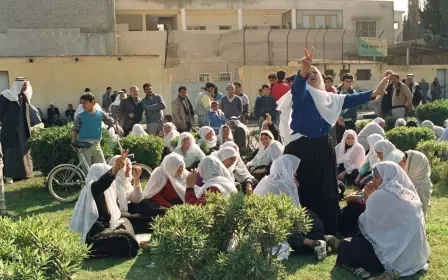Israel's closure of Covid clinic leaves 50,000 people at high risk

The sudden shuttering of a centre opened just weeks ago to administer Covid-19 vaccines to people living in Israel without legal papers has left roughly 50,000 already vulnerable people facing a dire situation.
The clinic, in Tel Aviv’s Neve Sha’anan neighbourhood, vaccinated 10,500 people in the 14 days it was open, welcoming anyone living in the country seeking asylum.
But the Israeli health ministry unexpectedly announced on Wednesday that “the site ha(d) exhausted its vaccine allocation of around 10,000 doses”, according to Haaretz, which said clinic staff were told “the allotment for this population has been used up.”
Around 50,000 statusless people living in Israel are yet to be vaccinated, according to calculations by NGO Physicians for Human Rights Israel (PHRI).
“It's very difficult to handle this decision,” Barhana Nagsi, a Sudanese asylum seeker who chairs the Organisation of Asylum Seekers in Tel Aviv, told Middle East Eye. “We don't speak the language, we don't understand what's going on and why they took such a discriminative decision against us.
New MEE newsletter: Jerusalem Dispatch
Sign up to get the latest insights and analysis on Israel-Palestine, alongside Turkey Unpacked and other MEE newsletters
“It took us time to explain the vaccine to the community of asylum seekers,” he added, “but at the moment they started to get it, the government - in a crazy step - decided to close the compound.”
Ron Goldstein, executive director of PHRI, told MEE he was happy when authorities opened the complex. Then, he said, “to our surprise we received a message that it was closed without any prior notice.”
“We do not understand what the logic is,” Goldstein said in a phone interview.
“There is no shortage of vaccines and Israel delivers all kinds of vaccines for political reasons,” he added, referring to Israel’s gifting of “unused” doses of the Moderna jab to Guatemala, Honduras and the Czech Republic, all of which recently increased their diplomatic presence in Jerusalem, a city that both Israel and Palestine claim as their capital.
Israel was also said to have agreed to purchase an unknown number of Russia's Sputnik V Covid-19 vaccine doses for use in Syria in exchange for the release of an Israeli woman who had crossed the border into the neighbouring country.
On Thursday Israel announced it would freeze the controversial policy of sending vaccines abroad to curry political goodwill, after it came under legal scrutiny.
Tens of thousands at risk
After rights groups protested the decision to close the Tel Aviv clinic, the Israeli health ministry said it would reopen temporarily from Thursday to Monday, providing a further 3,000 doses.
But tens of thousands of people without status will be left unvaccinated, and facing a potential health crisis.
The pandemic had already left many of them destitute. Roughly 80 percent of asylum seekers in Israel have lost their jobs since the outbreak of the coronavirus pandemic, as well as the benefits of private medical insurance that came with them.
Rights groups say the situation for those without status is dire, and worsening, with unprecedentedly long queues for food donations, according to Haaretz, and many asylum seekers living rough, without unemployment benefits, having defaulted on rent payments.
“It's a very difficult period for the asylum seekers,” said Nagsi of the Organisation of Asylum Seekers. “They are in total financial collapse.”
“If they don't get the vaccine they won't be accepted for work,” he added. “They are paying the price in all directions.”
Legal action
Goldstein said that human rights organisations have appealed to authorities to reverse the decision to halt the vaccines, “but we may have to go to court.”
Ayala Olier, of the Isha L'Isha Haifa Feminist Centre, told MEE: "We will press for those who are not vaccinated to be vaccinated, and if that does not work, we will raise the issue at an international level... We will not let this happen in silence."
Nagsi hopes media pressure will help overturn the decision. “If not we are planning next Thursday to take a group of asylum seekers in south Tel Aviv to another place to try to get the vaccine,” he said. “We will demonstrate with other organisations as well.”
Israel has had one of the world's fastest rollouts of Covid-19 jabs, with nearly half the population already having received one dose.
But it has so far given only 2,000 doses to the Palestinian Authority (PA), arguing that they are responsible for their own healthcare system.
The occupied West Bank and besieged Gaza Strip are home to 5.2 million Palestinians, who have accused Israel of ignoring its duties as an occupying power by not including them in its inoculation programme.
With around 32,000 doses in hand to date, the Palestinians launched limited vaccination programmes in the West Bank and Gaza this month, beginning with health workers.
'We have an amazing vaccination campaign in the country, but not only Israeli citizens live here'
- Ron Goldstein, PHRI
The PA expects to receive an initial Covax shipment within weeks, but the programme is at risk of failing, mainly due to a lack of funds.
The Palestinian territories have one of the lowest testing rates in the Middle East and North Africa, the World Bank said in a report this week.
The positivity rate in the West Bank is over 21 percent. In Gaza it is 29 percent, indicating an uncontrolled spread of the pandemic, the World Bank said.
There are no publicly-available statistics on the positivity rate of those living without status in Israel, but just a fraction of them now appear to have any chance of getting vaccinated.
“Health is a basic right regardless of one's status,” said Goldstein, of PHRI. “We have an amazing vaccination campaign in the country, but not only Israeli citizens live here.”
Middle East Eye delivers independent and unrivalled coverage and analysis of the Middle East, North Africa and beyond. To learn more about republishing this content and the associated fees, please fill out this form. More about MEE can be found here.





